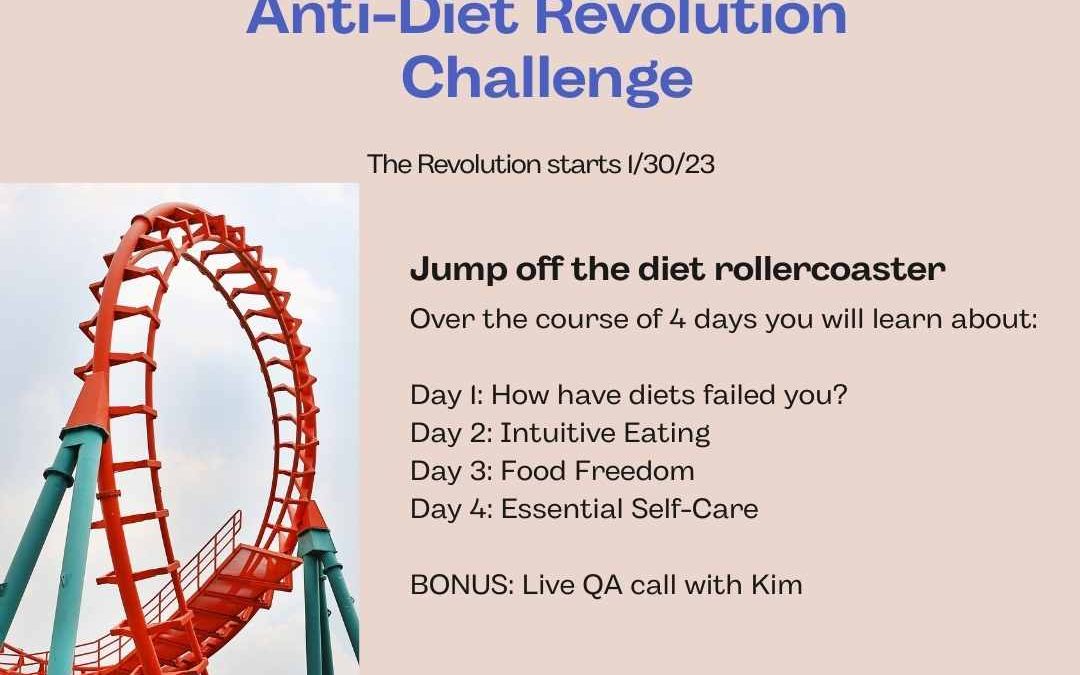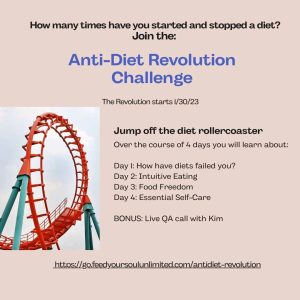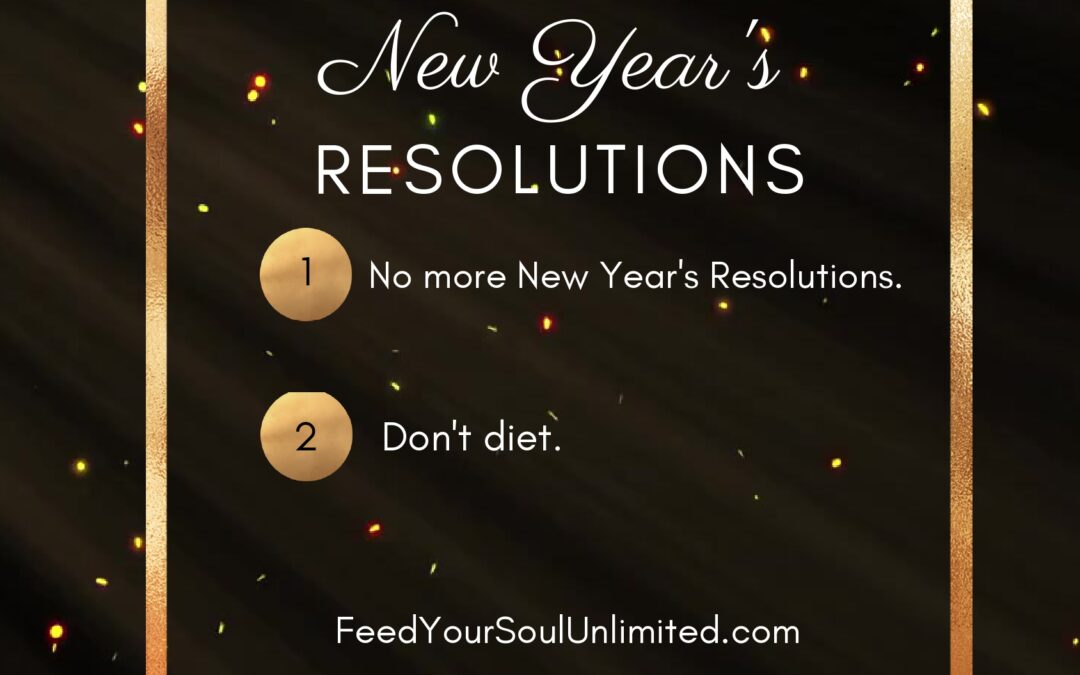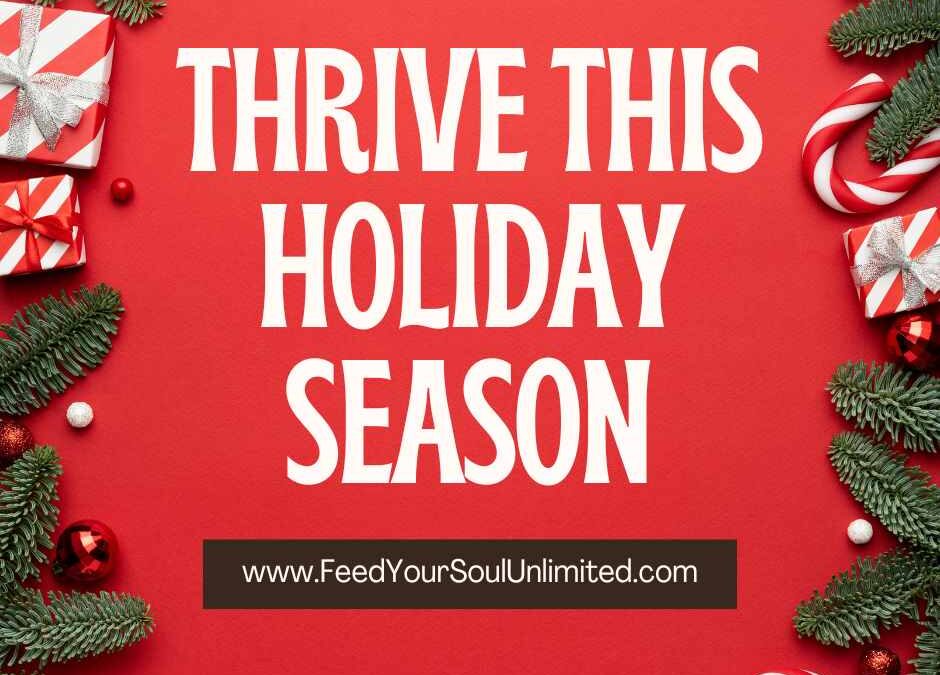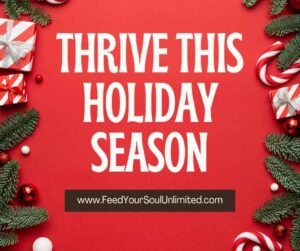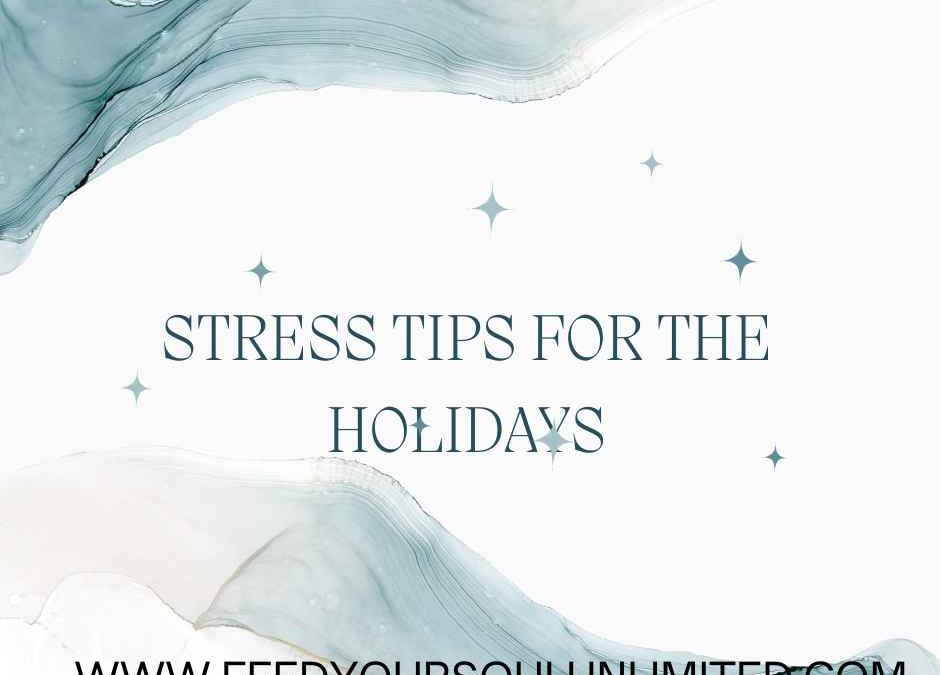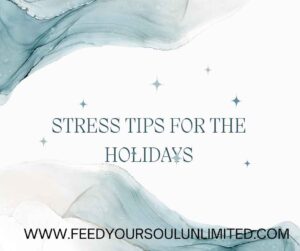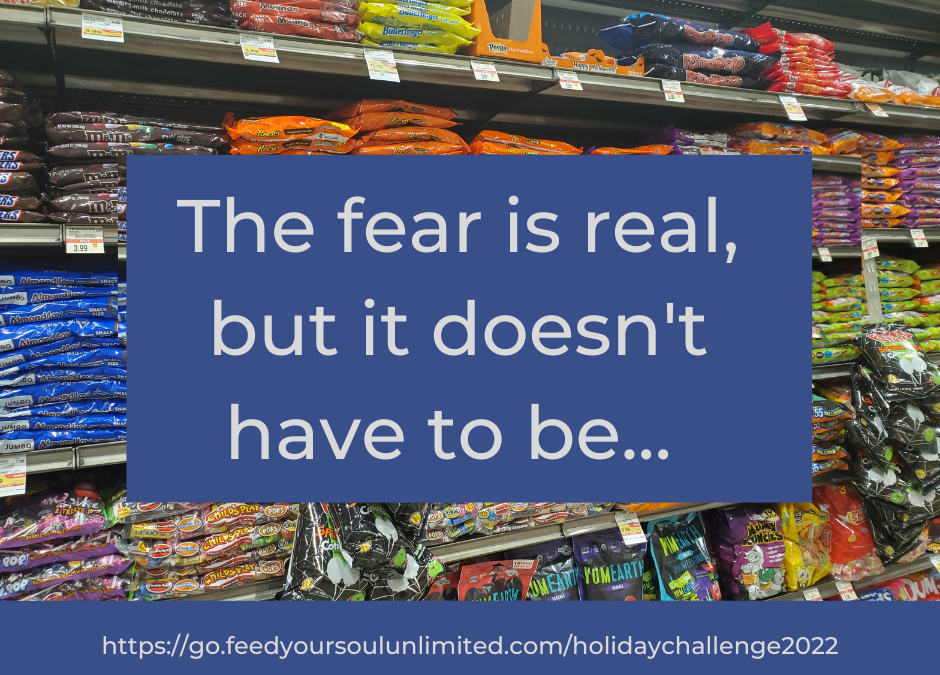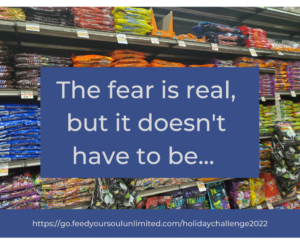
by KimMcLaughlin | Jan 26, 2023 | Lifestyle





Having an Anti-Diet Revolution is a pretty bold statement and desire. I have been on a mission to help people make peace with food and their bodies for years. I use intuitive eating as the framework to guide my clients to success.
There is this societal norm that we are supposed to want to be “healthy” and thin and the only way to get there is to go on a diet. We have agreed that the only way to get to thinness and “health” is through dieting.
Why have we all bought into the idea that “health” and thinness is our goal? We have been sold to by the LARGE corporations that make a lot of money (hello 60+Billion-dollar industry) off us failing.
I have many examples of going on the same diet over and over expecting a different result. I look back and wonder why in the world I did that. I am not stupid. I now see that I bought into the idea of what my body should look like, and I needed eat differently to make it right.
I bought into the idea that something was wrong with me, because of my size. The problem is the way I tried to fix my weight was by dieting.
Dieting does not accomplish what they say it will. It does not equal health.
There is an inherent harm in dieting, because it is focused on the external: what you eat and how much you weigh. Diets do not address why you overeat, why you binge, why you are obsess with food and can’t stop eating. Dieting leads to deprivation which leads you back to binging and the cycle starts up again.
If dieting is not the answer to overeating, what is?
Intuitive Eating is the way to move out of dieting and into a place of peace with food.
Imaging being able to notice when you are hungry and make decisions about what you shall eat easily. Your decision is not based on some system where you must track how much you eat. Eating the food and enjoying it. Noticing when you are satisfied and stop eating. Feeling energized with the food you eat. Getting a rhythm with food where you have a sense of what foods you like, what you do not like. Feeling empowered to eat what you want and not overanalyze it. Being able to determine what are your right foods that fit well with your body. There is no obsession with food. You can enjoy what you eat and if you eat beyond fullness you are able to course correct.
What does it take to be an intuitive eater?
- Notice when you are hungry.
- Notice what are the foods that satisfy you and give you the energy you need.
- Eat when you are hungry and before you are overly hungry.
- Stop when you are satisfied or gently full.
- Allow yourself to eat the foods you really want.
- Notice feelings that are causing you concern and take care of them.
- Engage in self-care and self-love.
- Notice thoughts that are negative and have ways to deal with them.
- Have a mindfulness practice that is soothing.
- Engage in movement that is right for you.
It takes time and energy to embrace intuitive eating and it will be the best thing you can do for yourself.
To move towards Intuitive eating, we are going to have the Anti-Diet Revolution. What is the Anti-Diet Revolution? We look at diet, diet culture and how YOU have been led astray.
We cannot end at ending dieting. What will you do instead?
- Have a way to measure hunger and fullness. This is a simple and profound practice that takes guess work out of eating.
- Determine what leads you to overeat.
- Have action plan for your self-care that REALLY work.
- Be in a place where others understand what you are experiencing, and you feel in community.
Join us for the Anti-Diet Revolution starting soon. Sign up now to get access to this free series to help you move out of dieting and into a plan of action that works.
Kim McLaughlin, MA is a Psychotherapist, Speaker, Author, and Coach who specializes in working with people who suffer from binge eating and emotional eating. She is a Certified Intuitive Eating Counselor. She is the author of the best-selling book Feed Your Soul Nourish Your Life! A Six Step System to Peace with Food and the Amazon #1 Best Selling book Discovery Your Inspiration.
You can find Kim on her podcast Feed Your Soul with Kim and you can find it on all podcast platforms.
Wondering if you are an emotional eater? Sign up for the free Am I an Emotional Eater Quiz.

by KimMcLaughlin | Jan 13, 2023 | Holidays, Lifestyle, Uncategorized





It is time to end dieting as a New Year’s Resolution. I know that contradicts what you normally hear this time of year.
We have bought into the idea that we need to diet (restrict) come the first of the year. Start dieting and exercise are the top 2 resolutions AND the top 2 failed resolutions.
When we look at New Year’s resolutions, consider that there is this cultural norm, this really kind of shared idea, at least in the United States.
I have noticed every January the gym becomes packed with people starting their dieting. I also remember the diet facilities I attended would be packed with people come January 1.
Come March 1 it would be back to normal. I have read statistics that only 9% of people keep their New Year’s Resolution.
Why don’t New Year’s Resolutions work?
First, they’re based on what you think you should do. There is this socially accepted idea that at the beginning of the year you should have a resolution.
Second is they make you want what you don’t have. Focusing on what we don’t have (thinner body) and what we lack, then that’s what shows up is things that we don’t have and the things that we lack.
Third, New Year’s Resolutions are poorly worded and unattainable.
Lastly, resolutions look for an easy answer. It looks for just kind of what’s the simple thing or what’s the kind of “easy.” There is no easy way to make changes. Going on a diet is not easy and it is not long-term successful.
It is not surprising that dieting at the new year is the most common New Year’s Resolution. We overeat and indulge over the holidays and then “pay the price for it” by dieting come January 1. It is a process of feast and famine.
We were “bad” over the holidays and need to be “good” at the start of the year. This process engages us in the cycle of diet/restrict- binge/overeat- shame/feel bad about ourselves. We are setting ourselves up to eventually overeat.
A part of the problem is the diet industry itself.
The diet industry is a multibillion-dollar industry. I have read different statistics of the money they make, and it is $58 Billion and above and the money they make increases ever year.
The diet industry is a failed industry. They make money because we do not lose weight and keep it off. We have all bought into the idea that if we just found the right diet or did it correctly, we would be thin.
We think that we are not ok. We need to be “healthy” and that is only be being thinner. If we were thinner, we would be healthy, attractive, in partnership, and I could go on and on.
Over the long term 80 to 95% of diets fail whereby the person gains back the weight and then some. I and people I know have experienced exactly this.
We have learned that if we gain back the weight, which is a product of dieting (diet/binge/shame cycle) we need to find the next diet. We are told and tell ourselves it is our fault. We have taken on this shame message that we are at fault. Remember the diet industry makes money off us feeling bad and unworthy.
Here are some ideas for a different plan rather than dieting.
Listen to your body’s needs.
- What is it your body wants? Using Intuitive Eating we focus on getting back in touch with your body and what it needs.
- What is your body asking for? Is it asking for sleep? Is asking for water? Or is it time to take a walk, get some movement in? Is it time to have conversations and get some kind of camaraderie going on? Give your body what it needs.
- Listen to your body’s physical hunger. Notice what it feels like to be physically hungry and satisfied. You might not know, yet, what it feels like to be gently hungry and satisfied.
The ideas about food, dieting and New Year’s Resolutions might be new for you. Just take them in. It might be hard to consider some or try all of the ideas presented here. Take a deep breath and see which idea you might like to look at first. You are worthy of being supported in this process and allow yourself to look at your relationship to dieting.
Kim McLaughlin, MA is a Psychotherapist, Speaker, Author, and Coach who specializes in working with people who suffer from binge eating and emotional eating. She is a Certified Intuitive Eating Counselor. She is the author of the best-selling book Feed Your Soul Nourish Your Life! A Six Step System to Peace with Food and the Amazon #1 Best Selling book Discovery Your Inspiration.
You can find Kim on her podcast Feed Your Soul with Kim and you can find it on all podcast platforms.
Wondering if you are an emotional eater? Sign up for the free Am I an Emotional Eater Quiz.

by KimMcLaughlin | Dec 21, 2022 | Holidays





Surviving seems to be the goal over the holidays. Seeing if we can just make it through the holidays and get to the end is the goal.
Getting to the place of thriving over the holidays can seem unattainable. Thriving can seem unreachable, because of all we have come to believe we must DO each holiday season.
How about imaging thriving as the goal? What would that look like?
- Slowing down.
- Be Mindful.
- Spend money in a reasonable manner.
- Use your time in a way that is enlivening.
I have been imagining (and practicing) how I can thrive this holiday.
Let’s start by looking at how is stress and overwhelm is showing up for you.
- Start by identifying what the overwhelm looks like.
Some helpful ways to connect with overwhelm is to journal and meditate. Get quiet to see how the stress and overwhelm are showing up for you.
- Are you responding to others’ expectations of you?
You might be feeling the need to always say yes. Thinking this is tradition. This is “what we always do.” Expectations can be overwhelming.
- Are you feeling scared about being around food?
Wondering how much food will there be? Will I eat too much? Will I be judged. Will I drink too much?
- Are you feeling bad about your body and how you look.
Feeling afraid others will notice your size and comment on it or disapprove of it? Or you just do not feel comfortable in your own skin.
- How is stress showing up in your body?
Stress can show up as sickness or feeling physically bad.
- Are you feeling fearful of not having enough time or money.
Time and money are limited resources and this time of year we think we have more than we actually do.
Money can become a problem when we rely on credit cards to pay, and we go into debt. Time becomes a problem when we do not plan well and become reactive.
Next, make a plan to manage the stress.
- A great technique is to ask yourself, “What is the stress and overwhelm trying to tell me?”
The feelings are informative and can provide a guidepost if you let it. Then sink into the question, “What do I really want?”
I recently became sick, and I asked my body what it was trying to tell me. I realized I was too overscheduled, and my body was saying I needed to rest more. The sickness MADE me have to rest and I did.
- It can be helpful to plan to incorporate food into your holiday. Food can be a huge trigger this time of year.
A helpful strategy is to eat 3 meals a day. Eat what you normally eat. Don’t save up for the “big meal,” because this is a set up to restrict/binge/shame. When we do not eat regularly, our body thinks we are restricting, and it will lead you to crave food and overeat.
- You might wonder if you need to say no to sugary treats?
Not allowing yourself to have sugary treats can set you up to binge. If you deny what you want ultimately when emotions show up, you will have less resolve to not eat the sugary foods. Instead of denying yourself, allow yourself to have what you want. When you are eating regular meals and allowing yourself treats, there is less likelihood that you will binge. If you do binge, forgive yourself and move on. Being stuck in anger and resentment about overeating will NEVER lead to a change in behavior.
- Set limits on others AND yourself? Say no to what does not work for you.
This is the time of expectations other can have of us. What is it that you want to do? Do that!
Where is your NO to other people? What will you do, and won’t you do? I think it is a time to have more no’s than yes’. It is ok to say no to a past family tradition, if they are not what you want this year. Doing things for others because we think we have to leads to overwhelm and stress. Let’s do it differently this year.
Lastly, we tend to put expectations on ourselves. We think we need to bake, clean, buy, go out, etc. We think we need to maintain holiday traditions. Take a deep breath and determine if this still fits for you. Say no when you need to.
This holiday is an opportunity to thrive.
First, focus on what is right for you? Yes, you can be limited in the activities that you do. Time is a limited resource, use it wisely.
I have decided I want more rest and peace this holiday season. Being in front of the twinkling lights is thriving for me.
Second, coping strategies are really thriving strategies. Say no as you need to. Ask for what you want. Set your expectations on time and money. Eliminate the stressors. Take that internal check to see what stresses you and find a way to let go of the stressor.
Third, what is your reason for the season?
- What is this holiday about for you?
- What do you want to be, do, have after the holiday?
- What do you want to come away with after the holiday? Focus on making this happen.
My desire for this holiday is to experience more peace, light, joy, and love. My plans for this holiday are designed to meet that desired goal.
Lastly, be intentional about this holiday to get all the goodness out of it.
Kim McLaughlin, MA is a Psychotherapist, Speaker, Author, and Coach who specializes in working with people who suffer from binge eating and emotional eating. She is a Certified Intuitive Eating Counselor. She is the author of the best-selling book Feed Your Soul Nourish Your Life! A Six Step System to Peace with Food and the Amazon #1 Best Selling book Discovery Your Inspiration.
You can find Kim on her podcast Feed Your Soul with Kim and you can find it on all podcast platforms.
Wondering if you are an emotional eater? Sign up for the free Am I an Emotional Eater Quiz.

by KimMcLaughlin | Nov 24, 2022 | Holidays





If you look anywhere on the internet you will hear about the stress of the holidays. I wondered what you are think about stress over the holidays, so I asked.
I ran a survey asking:
Do you need strategies to support you with food and all the overwhelm this holiday season?
A whopping 86 percent said yes, they need strategies with food and all the overwhelm this holiday season. I was struck by how large the number was, 86%. It is not that you just have stress and overwhelm, but you do not know what to do about it!
That is a lot of people!
This stress and overwhelm can show up as:
- Loneliness
- Family drama
- Money problems
- Overeating
- Normal routines are gone, due to the increased activities
- Unreasonable expectations
Loneliness can be so devastating and unexpected at the holidays. There are movies and songs about being surrounded with others. What if you have been wronged by family members, they are not people you want to be with, or they simply live nowhere near you. You could be unhappy with people in your family, unwilling to see them, setting boundaries on them. Even with boundaries there can be loneliness. There is the expectation that we will want to be with family, but that might not be the case.
A strategy for loneliness is to be with someone. Who is someone you like or feel close to? Someone you might want to reach out and say hi to? Who is it you enjoy spending time with? Reach out to them. You might be surprised at their response.
Another strategy to curb loneliness is by spending time with a pet. This can be just the right opportunity to feel close without the expectations of others.
Family drama is very common. Do you feel you have to see family members you do not feel close to, do not feel connected to or maybe you just do not like them? There is the air of expectation that you want to be with people you are related. It is stressful and overwhelming to try to be around people you think you are supposed to be around.
A strategy to deal with family drama is to be gentle with yourself. You are the only one who knows what is right for you. When there is family drama it can be so helpful to set boundaries. If needed, say no to what you need to say no to. This is your life to live.
Money is a huge issue during the holidays. There are expectations we are supposed to buy things for others. You might feel the expectation to buy something out of your price range or you just don’t have the funds for it this year. That is super stressful.
A strategy is to focus on what you are grateful for. It quickly changes your heart and mindset to the positive. This will not bring you money, but it will change your attitude. Remember, there is no requirement that you need to buy things for others.
Overeating is another problem that leads to overwhelm and stress over the holidays. There are so many foods we do not have at other times of the year that are so inviting. We can either go all in and eat everything or say no I will not have any of it. This can become a feast or famine time of year. Often people decide to feast (overeat) during the holidays and famine (diet) at the new year. This leads to stress about weight, fullness, and self-loathing.
There are many strategies to deal with food in a productive way over the holidays.
First, notice what foods you really want and have them. Yummy foods are delicious and there are many seasonal items.
Second, go easy on yourself. There are so many emotions and mixed priorities during the holidays that stress increases.
Third, get support from people who do not focus on dieting. Get valuable tips and strategies to look at food differently. I would suggest that you join us in the Peace with Food over the holidays program (it is very affordable and supportive).
Normal routines are gone over the holidays. Travel, guests, and schedule changes create a different schedule than what you are used to. This increases stress in our bodies.
One strategy is to keep your bedtime routine as close to normal as possible. Good sleep is critical to end overeating and to keep stress and overwhelm down. This sounds like such a simple suggestion, but it really works!
Lastly, there are so many unreasonable expectations we put on ourselves or put on us by others. These expectations take us away from our needs and wants. Possibly you do not even know what you need or want.
A strategy is to take some time to determine what you want to do or be over the holidays and do that. In Peace with Food over the holidays program we talk about determining what you want to do. I call it a Holiday Bucket List. Determine what is right for you and do that. What is the most important thing for me to do?
Peace with Food Over the Holidays:
The holidays are full of stress and overwhelm. Kim has an easy online course designed to fit into your busy schedule and give you some quick wins to feel peaceful during the holidays. Check out Peace with Food over the holidays program. It is a low-cost high value program with quick lessons to get you on track and keep you on track over the holidays.
Kim McLaughlin, MA is a Psychotherapist, Speaker, Author, and Coach who specializes in working with people who suffer from binge eating and emotional eating. She is a Certified Intuitive Eating Counselor. She is the author of the best-selling book Feed Your Soul Nourish Your Life! A Six Step System to Peace with Food and the Amazon #1 Best Selling book Discovery Your Inspiration.
You can find Kim on her podcast Feed Your Soul with Kim and you can find it on all podcast platforms.
Wondering if you are an emotional eater? Sign up for the free Am I an Emotional Eater Quiz.

by KimMcLaughlin | Oct 25, 2022 | Binge eating, Holidays




I have many memories of struggling with food over the holidays.
When I was single, I feared having food (specifically candy) in the house. At Halloween time I would buy a bag of candy my thought was to use it on Halloween, but that never happened. I always ate it. It wasn’t that I just ate it. I ate it all and felt so ashamed. I was convinced that I could not stop.

I came up with a plan…
I would go to the gym on Halloween night. I don’t know if you have been to the gym on Halloween night- there are not many people there. I thought it was the only way that I could stop myself from overeating on candy. If I was not home to give out candy, they I would not have to buy the candy. It was my way of not binging on candy. It worked if I did not buy the candy.
When I returned home from the gym, I would sneak into the house, go upstairs, and watch television with the lights out so no one would knock on my door. I did not feel brave enough to tell them I had no candy, I wanted to avoid the whole scene.
I then married a man who loved to give out candy on Halloween. He bought the candy and did not open the bag before Halloween. On Halloween he ate few pieces and took the rest to the office to share with his co-workers.
I have learned that it is ok to have candy in the house and I do not have to be afraid of it. It does not call my name like it used to. I used to feel compelled to eat the candy or any sweets if it was in the house. My head would say, you know you are going to eat it, just do it. I was convinced that I had no control over candy.
I learned about Intuitive Eating.
It took me time and effort to feel freedom with candy. It is doable. We now have candy in the house, and it does not call to me. I do not think about it, and I have it when I want it. It is not a struggle anymore.
I have been creating my newest program Peace with Food Over the Holidays and have been looking at what does help to release the grip food and sweets can have on us. Interestingly, it is not all focused on how to manage food. Food is one of the many components that lead to peace with food.
In order to have Peace with Food Over the Holidays we need to look at:
- Physical: How to look at food/candy differently. There are simple tweaks that can make you feel so much more successful.
- Emotional- How to deal with emotions that surely come up over the holiday season.
- Mental: Those thoughts about food can be overwhelming. Finding some tools to manage them is critical.
- Lifestyle/Social: Learning how to say no and set boundaries is crucial.
- Mindfulness: How can you get quiet with yourself when there are so many competing priorities AND you are not one of them?
- Self-Love: What do you really need? If you were going to be loving to yourself, what would you do?
Notice that only one component is focused on the physical, which includes food! The reason why it feels so hard to put food in its place as nourishment is because we focus on food and generally it is on restricting food.
Food restriction does not work.
What works is bringing balance and synergy to all of the components. I will not lie to you; it does take effort to learn and practice this new way. It is worth it, and it does work.
As an end note…
I now happily give out candy to our neighbor kids. I do not feel afraid when my daughter brings home her Halloween candy. I have a piece and it is not a big deal.
Do you wish this for yourself? It is possible!
Need support for food this holiday season?
Peace with Food: Holiday Edition is coming!!! This is a super affordable way ($29) to get peace with food this holiday season. Check it out here: https://go.feedyoursoulunlimited.com/holidaychallenge2022
Kim McLaughlin, MA is a Psychotherapist, Speaker, Author, and Coach who specializes in working with people who suffer from binge eating and emotional eating. She is a Certified Intuitive Eating Counselor. She is the author of the best-selling book Feed Your Soul Nourish Your Life! A Six Step System to Peace with Food and the Amazon #1 Best Selling book Discovery Your Inspiration.
You can find Kim on her podcast Feed Your Soul with Kim and you can find it on all podcast platforms.
Wondering if you are an emotional eater? Sign up for the free Am I an Emotional Eater Quiz.
